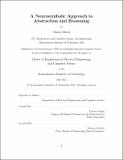A Neurosymbolic Approach to Abstraction and Reasoning
Author(s)
Alford, Simon
DownloadThesis PDF (4.258Mb)
Advisor
Poggio, Tomaso
Terms of use
Metadata
Show full item recordAbstract
Current deep learning systems are highly specialized to whatever task they are designed to solve. Their application to more general domains is limited by their inability to form explicit, systematic knowledge and reason over it. Such an ability would be required for a machine to, for instance, rediscover the scientific method, and use this method to learn new things. This thesis attempts to make progress on this front by developing an approach for the Abstraction and Reasoning Corpus (ARC), an artificial intelligence benchmark consisting of a set of few-shot visual reasoning tasks which measures the ability for an agent to solve tasks beyond those specified by the developer. We present two approaches that address that challenges posed by ARC. First, we give an approach for learning abstractions on ARC. We apply a program synthesis system called DreamCoder to create symbolic abstractions out of the solutions of tasks solved so far. These abstractions enable the solving of progressively more difficult ARC tasks. Second, we design a reasoning algorithm for ARC motivated by the way humans approach solving ARC tasks. Our algorithm combines execution-guided program synthesis with deductive reasoning based on inverse semantics, enabling a bidirectional, execution-guided program synthesis algorithm for solving ARC tasks. Despite difficulty ultimately achieving high performance on ARC, we believe the approach is a firm basis for a learning-based search algorithm for ARC, especially compared to existing brute-force approaches. We additionally evaluate the bidirectional algorithm on a set of “24 Game” style math puzzles. We conclude by discussing how these two approaches can be combined as well as future research directions relevant to ARC and AI in general.
Date issued
2021-06Department
Massachusetts Institute of Technology. Department of Electrical Engineering and Computer SciencePublisher
Massachusetts Institute of Technology